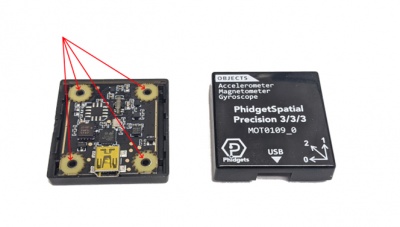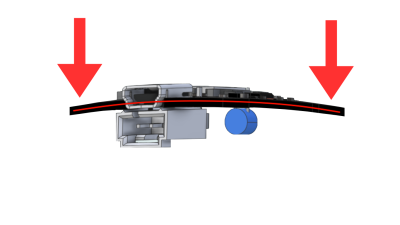Template:UGC-SpatialMounting: Difference between revisions
From Phidgets Support
No edit summary |
No edit summary |
||
| Line 16: | Line 16: | ||
Ensure the bolts are tight enough to prevent the Phidget Spatial from moving, but not so tight that they strain the board. Any strain on the board can introduce unwanted measurement errors. | Ensure the bolts are tight enough to prevent the Phidget Spatial from moving, but not so tight that they strain the board. Any strain on the board can introduce unwanted measurement errors. | ||
[[Image:Spatial_mounting_strain.png|link=|center|400px]] ''Exaggerated flexing of the device from overtightened bolts. Overtightening is generally imperceivable to the eye, but can cause large measurement errors.'' | [[Image:Spatial_mounting_strain.png|link=|center|400px]] | ||
<center>''Exaggerated flexing of the device from overtightened bolts. Overtightening is generally imperceivable to the eye, but can cause large measurement errors.''</center> | |||
<br> | |||
We recommend using a thread locker on your bolts to prevent them from slowly moving over time. This is especially important in systems that are exposed to vibrations. | We recommend using a thread locker on your bolts to prevent them from slowly moving over time. This is especially important in systems that are exposed to vibrations. | ||
</div> | </div> | ||
Revision as of 17:39, 12 April 2024
Mounting Considerations
Phidget Spatials are excellent at detecting and measuring motion. Mounting your Phidget Spatial correctly will ensure you get the most accurate results possible.

We recommend mounting the board in its enclosure, directly to your system using M2 bolts. Follow these steps:
- Remove the top half of the enclosure.
- Locate the four mounting holes.
- Bolt the Phidget Spatial to your system.
- Reattach the top half of the enclosure.
Ensure the bolts are tight enough to prevent the Phidget Spatial from moving, but not so tight that they strain the board. Any strain on the board can introduce unwanted measurement errors.

We recommend using a thread locker on your bolts to prevent them from slowly moving over time. This is especially important in systems that are exposed to vibrations.
